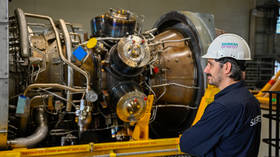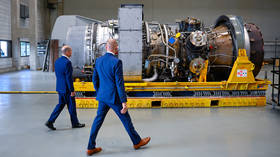Siemens accuses Gazprom of lying – media

Siemens Energy has reportedly accused Russia’s energy giant Gazprom of lying when saying that international sanctions are preventing the return of a turbine for the Nord Stream 1 pipeline from Germany to Russia.
“Everything that could be said on this issue has been said, even the German chancellor was there yesterday and spoke, there is nothing more to say… There are no EU sanctions against the turbine, it's just not true,” Russian business news outlet RBC quoted a Siemens Energy representative as saying on Thursday.
Russia cites “various reasons” on a daily basis as to why the turbine cannot be accepted by Gazprom, Siemens Energy said, as quoted by RBC. According to the company, if Russia really wanted to receive the equipment, it would have already happened.
On Wednesday Gazprom said Western sanctions make the delivery of the Nord Stream turbine from Germany to Russia impossible.
“The sanctions regimes of Canada, the EU, the UK and the inconsistency of the current situation with the current contractual obligations on the part of Siemens make the delivery of the 073 engine to the Portovaya [compressor station] impossible,” Gazprom said in a statement.
Earlier on Wednesday, Siemens Energy CEO Christian Bruch said the German company had fulfilled all conditions for sending the repaired turbine back to Russia. According to Bruch, the company is “extremely interested” in advancing the process and blamed missing documents from the Russian side for the delay. German Chancellor Olaf Scholz inspected the Nord Stream turbine and stated that it was ready for operation and could be sent to Russia any time.
In mid-June, Gazprom reduced gas supplies via Nord Stream to 40% of capacity, as Siemens had not returned the turbine in time after repairs in Canada, due to Ottawa's sanctions on Moscow. After pressure from Berlin, Canada agreed to send the turbine to Germany, and then on to Russia.
On July 25, Gazprom confirmed that it had received documents for the turbine from Siemens. According to the Russian company, however, the papers failed to clarify issues raised by the sanctions and the delivery of the part to Germany constituted a breach of contract.
As of the time of this writing, the turbine remains stuck in Germany.
For more stories on economy & finance visit RT's business section













